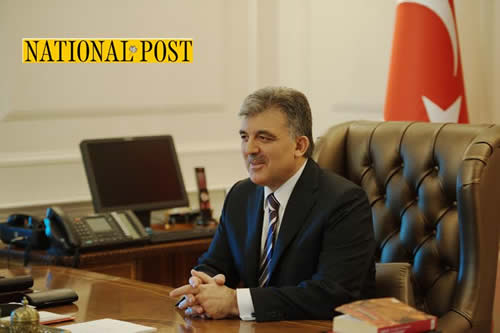11. Cumhurbaşkanı Gül, National Post için Yazdı
27.11.2015

On Oct. 10, 2015, two suicide bombers attacked civilians at the heart of Ankara that were gathered to rally for peace. This cowardly terrorist attack by the Islamic State (ISIL) claimed the lives of more than 100 innocent Turkish citizens, the worst terrorist attack in Turkish history. The murderers behind this vicious act have succeeded in dividing our nation and triggering a hurtful, and ultimately futile, blame game not just in Turkey but also among our friends.
They must not succeed anymore. We must break their narrative. Selective preferences about victims and perpetrators, associating terrorism with specific religions or ethnic and sectarian groups, cannot be allowed to stand in the face of this common enemy and threat.
Is it really an ontological impossibility for Muslims to achieve democratic governance?
This divisive blame game has been going on for many decades and unfortunately, our holy religion, Islam, has suffered asymmetric wounds. Yet, we cannot descend into defensiveness and denial. I would like to strike a new path.
Let me start with some meditations.
It is surely clear that the perception of Islam in most of the non-Islamic world is not especially pleasant these days. Using that perception, let me be a little provocative for the sake of discussion: Islam is the religion of the East, of rather primitive and uneducated peoples who don’t understand democracy and secular values, who both kill and die easily and in rather barbaric ways, and who, more than anything else, hate the West.
Irrationality is the main adjective attributed to the great majority of Muslims, along with many others: oppressive, outmoded, restrictive, extremist, backward, dangerous. Media coverage, a great deal of which is distorted or framed according to pre-conceptions, constitutes a major reason for this perception.
Yet, we cannot just blame the Western media and colonialism and simply acquit ourselves. If there is a gap between what we believe to be the case and how we are perceived as Muslims, a multitude of issues have to be investigated, neutrally, and without an ideological lens.
The first, and most urgent question relates to ISIL in particular, and Salafi commentaries on Islam in general. As the Salafi readings of the Holy Book constitute the basis of ISIL’s claims, we need to ask why these readings have gained prominence, rather than the milder ones of the mainstream Sunni or Shia branches.
Should we attribute it to the endless wars of attrition in Afghanistan, Iraq, and Syria, all of which began under the promise of “bringing democracy” to those lands? Or should we attribute it to the fact that none of the mainstream branches of Islam have produced new commentaries for far too long?
A second, and at least as pertinent, group of questions relates to the reasons for a rather homogeneous perception of Islam. Muslims, as dominant groups, live in vast lands from the Western shores of the Maghreb to Indonesia, from the Siberian steppes to Sub-Saharan Africa, in different geographies, cultures, languages, races, and within belief systems that may significantly differ along sectarian or national frames of reference.
Yet, the term “Muslim” is often taken to signify something distinctly homogeneous. There is no such equivalent homogeneity attributed to the term “Christian” or the believer in any other religion. This tendency is important to note, as it makes it easier to create a common stereotype.
Should we attribute all this to a rather dismissive and ignorant Western perspective that prefers to simplify things that lie outside of its proximate cultural realm? Or is it because Muslims, as a result of their belief in the unity of “ummah,” prefer to represent themselves as a unified family, however fanciful such an ideal would be to translate into reality after the last decade in the Middle East?
The third area to investigate is the relationship between Muslims and democracy. Here, I consciously use the term “Muslims and democracy,” rather than, “Islam and democracy”, as I believe that Islam does not dictate any specific form of governance.
The general wisdom in Western circles is that Islam and democracy don’t go well together. That is why the example of Turkey is so precious, they argue. Going through different periods of Islamic history, one may easily observe democratic forms of governance in Muslim cities, if not states, prior to the 14th century, and, in any case, long before the re-birth of democracy in the West.
That is why this issue deserves further elaboration. Is it really an ontological impossibility for Muslims to achieve democratic governance? Or is it more the result of a historic accumulation that has nearly always shown to Muslim societies the rather unpleasant faces of democracy: as a tool of intervention, as a discourse of superiority, or as a reason for instability.
There are many other questions to be asked and a productive debate is needed now more than ever.
But as a Muslim and a Turkish statesman, I believe that Muslims can adopt democracy and be very successful at it, too. I believe that Muslims can peacefully co-exist with universal values, that Muslims have contributed vastly to the universal accumulation of humanity and will continue doing so, that Muslims have produced examples par excellence of scientific, cultural, social and political structures throughout history and are perfectly able to do so today — just as the believers of any other religion are.
It is up to Muslims themselves to undertake a serious re-appraisal of their place in history, and their place today. And it is up to the rest of the world to question and reappraise their own “shortcut” perceptions about Muslims. Hard tasks indeed, but tasks that need to be faced.